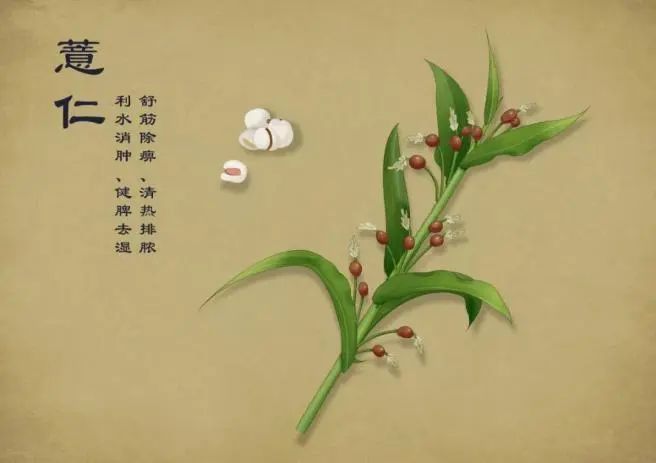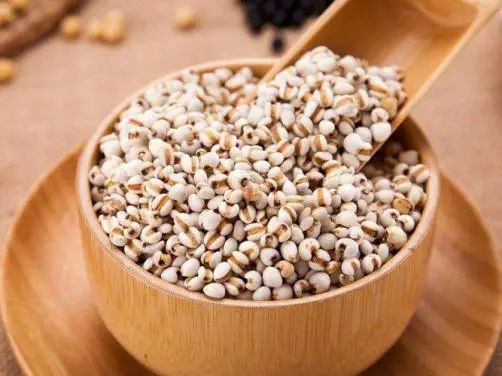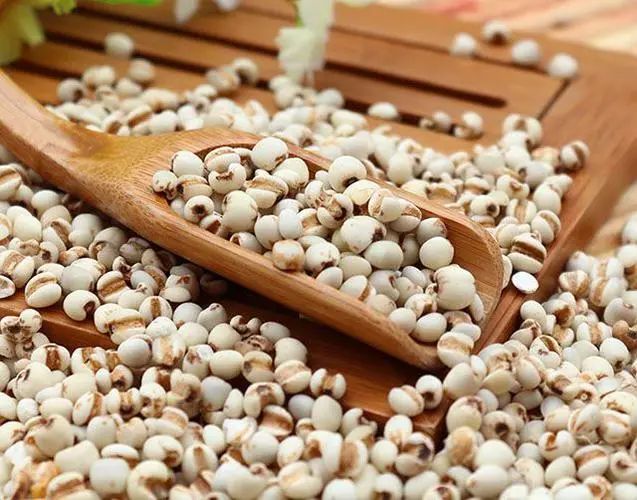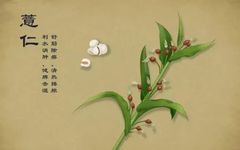

Coix Seed, known as Bai Yi Ren (薏苡仁), is the dried mature seed of the plant Coix lacryma-jobi L. var. mayuen (Roman.) Stapf. It is primarily produced in Fujian, Hebei, and Liaoning provinces. The seeds are harvested in autumn when the fruits are ripe, dried, and then the seeds are separated from the husk, yellow-brown seed coat, and impurities. The best quality seeds are large, plump, and white.


【Characteristics】
Coix Seed: The seeds are broad oval or elongated oval in shape, measuring 4-8mm in length and 3-6mm in width. The surface is milky white and smooth, occasionally with remnants of the yellow-brown seed coat. One end is blunt and rounded, while the other end is wider and slightly concave, with a light brown dot-like hilum. The back is rounded and convex, and the front has a wide and deep longitudinal groove. The texture is firm, and the cross-section is powdery white. It has a faint aroma and a slightly sweet taste. The best seeds are large, full, white, and without broken skins.
Fried Coix Seed: Slightly bulging, with a light yellow surface and slight scorch marks, having a faint fragrance.

【Taste and Meridian Entry】
Sweet, bland, and cool. It enters the Spleen, Stomach, and Lung meridians.

【Functions and Indications】
Promotes urination and drains dampness, strengthens the Spleen, stops diarrhea, eliminates pus, and resolves masses. It is used for edema, beriberi, urinary difficulties, Spleen deficiency diarrhea, damp bi syndrome, lung abscess, intestinal abscess, warts, and tumors.


【Effectiveness Analysis】
Coix Seed is mild in its ability to drain dampness and promote urination, and its sweet flavor benefits the Spleen. It is particularly suitable for those with Spleen deficiency and damp stagnation. It primarily enters the Spleen and Stomach meridians, effectively draining Spleen dampness while also tonifying the Spleen to stop diarrhea, making it an excellent choice for treating edema and abdominal distension due to Spleen deficiency and excess dampness, beriberi, urinary difficulties, and poor appetite.
Coix Seed is effective in eliminating dampness from the muscles and joints, alleviating bi syndrome and spasms. Therefore, it can be used for chronic wind-damp bi syndrome and muscle spasms.
Coix Seed is cool in nature, capable of clearing heat and draining pus, commonly used for lung abscess with cough and thick phlegm, chest pain, and intestinal abscess.
Coix Seed can detoxify and resolve masses, making it useful for warts and tumors.

【Compatibility Applications】
1. Coix Seed with Winter Melon Peel
Coix Seed excels in strengthening the Spleen and promoting urination; Winter Melon Peel is effective in promoting urination and reducing swelling. The combination of these two herbs has the effect of strengthening the Spleen and promoting urination, used for treating edema due to excess damp-heat and Spleen deficiency with reduced urination.
2. Coix Seed with Bai Zhu (Atractylodes)
Coix Seed is effective in promoting urination and draining dampness; Bai Zhu is known for tonifying Qi and strengthening the Spleen while drying dampness. Together, they enhance the Spleen tonifying and dampness-draining effects, used for treating Spleen deficiency with excess dampness leading to loose stools and fatigue.
3. Coix Seed with Ma Huang (Ephedra)
Coix Seed is effective in eliminating dampness and relieving bi syndrome; Ma Huang is known for inducing sweating and releasing the exterior while promoting urination. The combination of these two herbs has the effect of dispelling wind, scattering cold, and eliminating dampness, used for treating bi syndrome with wind-dampness manifesting as body aches and stiffness.


【Differentiation Applications】
1. Raw Coix Seed vs. Fried Coix Seed
Both are different processed forms of Coix Seed, with varying effects due to their preparation methods. Raw Coix Seed is cooler in nature, excelling in promoting urination and draining dampness, clearing heat and draining pus, relieving bi syndrome, and detoxifying. It is particularly suitable for treating beriberi, edema, urinary difficulties, damp bi syndrome, intestinal abscess, lung abscess, warts, and tumors. It is used for edema, but due to its weaker diuretic effect, it is more suitable for mild cases. Fried Coix Seed is more neutral in nature, excelling in strengthening the Spleen and stopping diarrhea, commonly used for diarrhea due to Spleen deficiency with dampness. Clinically, raw Coix Seed is primarily used for conditions caused by damp-heat leading to lower limb bi syndrome, while fried Coix Seed is often used for strengthening the Spleen; due to its weaker effect, larger doses are recommended.
2. Coix Seed vs. Fu Ling (Poria)
Both can strengthen the Spleen and drain dampness, and both enter the Spleen meridian, commonly used together for Spleen deficiency with excess dampness. However, Coix Seed has a milder effect and requires larger doses to be effective; it enters the Lung and Stomach meridians, is cool in nature, and can relieve bi syndrome, drain pus, and detoxify. It is commonly used for damp bi syndrome, lung abscess, intestinal abscess, warts, and tumors. Fu Ling, on the other hand, is neutral and mild, serving as a key herb for promoting urination and draining dampness, with stronger effects than Coix Seed. It can be used for edema regardless of cold or heat, and is often used to treat phlegm-damp conditions such as dizziness, palpitations, and cough, as well as having a calming effect for insomnia and restlessness.

【Formula Examples】
1. Shen Ling Bai Zhu San(“Formulas from the Bureau of Harmonization”)
Ingredients: Lotus seed, Coix Seed, Amomum fruit, Platycodon root, White lentil, White Poria, Ginseng, Licorice, Bai Zhu (Atractylodes), and Chinese yam.
Functions and Indications: Tonifies Qi, strengthens the Spleen, drains dampness, and stops diarrhea. Suitable for Spleen deficiency with excess dampness, food stagnation, chest and abdominal fullness, intestinal rumbling and diarrhea, fatigue, weight loss, pale yellow complexion, pale tongue with white greasy coating, and weak pulse.
2. San Ren Tang(“Differentiation of Warm Diseases”)
Ingredients: Apricot kernel, slippery rock, white herb, white cardamom, bamboo leaf, magnolia bark, Coix Seed, and Pinellia.
Functions and Indications: Unblocks Qi, clears damp-heat. Suitable for early onset of damp-warmth and summer-heat with dampness predominating over heat, presenting with headache, chills, body aches, fatigue, pale yellow complexion, chest tightness, lack of appetite, afternoon fever, white tongue without thirst, and wiry, thin, and slippery pulse.
3. Wei Jing Tang(“Secret Essentials of External Medicine” citing “Ancient and Modern Verified Formulas”)
Ingredients: Reed stem, Coix Seed, melon slices, and peach kernel.
Functions and Indications: Clears the lungs, transforms phlegm, promotes blood circulation, and drains pus. Suitable for lung abscess with heat toxin stagnation, phlegm and blood stasis, presenting with slight fever, cough with copious phlegm, possibly with foul-smelling pus and blood, and slight chest pain, red tongue with yellow greasy coating, and slippery, rapid pulse.
4. Coix Seed, Aconite, and Baijiao Powder (“Essentials of the Golden Cabinet”)
Ingredients: Coix Seed, Aconite, and Baijiao.
Functions and Indications: Drains pus and reduces swelling. Suitable for intestinal abscess with pus formation, no fever, with a hard abdomen, and a pulse that is rapid.
 END
END
References
1. Clinical Medication Guidelines, 2015 Edition, Chinese Herbal Medicine Volume;
2. Chinese Clinical Pharmacology Dictionary, Chinese Herbal Medicine Volume.

Note: The images in this article are sourced from the internet and are used for public dissemination. We thank the authors of the images, and if there are any copyright issues, please contact us for removal. Thank you.
Author: Cheng Xiaorong, Deputy Chief Pharmacist, Pharmacy Department, Zhongshan People’s Hospital, Guangdong Pharmaceutical Association
Editor: Ye Zhenquan, Pharmacy Department, Shenshan Central Hospital, Sun Yat-sen Memorial Hospital, Sun Yat-sen University, Guangdong Pharmaceutical Association
The above is an original article from “Lingnan Pharmacy”. Reproduction requires authorization and must indicate the source, author, and reviewer.




